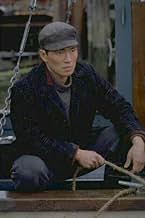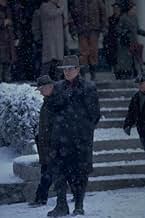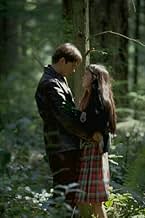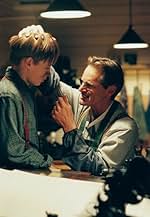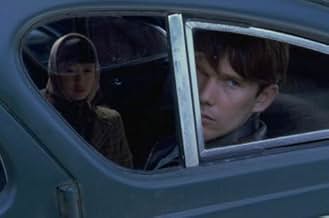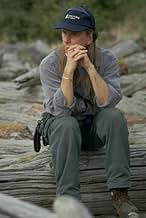VALUTAZIONE IMDb
6,7/10
14.846
LA TUA VALUTAZIONE
Un pescatore Giapponese-Americano è accusato di aver ucciso il suo vicino in mare.Un pescatore Giapponese-Americano è accusato di aver ucciso il suo vicino in mare.Un pescatore Giapponese-Americano è accusato di aver ucciso il suo vicino in mare.
- Candidato a 1 Oscar
- 5 vittorie e 11 candidature totali
Max von Sydow
- Nels Gudmundsson
- (as Max Von Sydow)
Yûki Kudô
- Hatsue Miyamoto
- (as Youki Kudoh)
Daniel von Bargen
- Carl Heine Sr.
- (as Daniel Von Bargen)
Recensioni in evidenza
This is one of those films that needs to be seen a second time to pick up on the subtleties of the plot. It is a feast for the eyes and features outstanding acting. It also has a sense of balance. It doesn't manipulate its viewer. The murder mystery isn't one that brings in forces that threaten the main character. The forces are prejudice and fear. The adversaries are not people carrying guns but rather the legal system that often overlooked the rights of people of another race or ethnic background. The internment camps are part of the backdrop. I know that people say this is slow, but so is the process these people faced.
I loved the intellectual character of the young man who has to look past his own feeling and try to bring closure to someone he will never be able to have. The transitions are so breathtaking. The winter scenes are a portrait of softness and violence. My wife had read the book upon which this is based and said that the movie might be interesting. Apparently, the producers were unwilling to go the extra mile to get this noticed. It's a gem and deserves to be on a list of very fine movies.
I loved the intellectual character of the young man who has to look past his own feeling and try to bring closure to someone he will never be able to have. The transitions are so breathtaking. The winter scenes are a portrait of softness and violence. My wife had read the book upon which this is based and said that the movie might be interesting. Apparently, the producers were unwilling to go the extra mile to get this noticed. It's a gem and deserves to be on a list of very fine movies.
`Snow Falling on Cedars' stands as one of the most visually ravishing films of the past several years. Beautifully attuned to the natural splendor of its Washington State locale, the film actually converts its setting into one of the major characters in the film. Nature, in the form of topography, flora and weather, seems to exert, if only subliminally, as much influence on the people involved as their own actions and passions. However, there is always a drawback to a movie being so closely tied to its physical environment: very often the background advances to the foreground, ultimately overwhelming and dwarfing the human figures that should be our primary focus. Almost inevitably then, `Cedars' itself falls victim to this syndrome from time to time. Despite many intriguing elements in its narrative, we do come away remembering far more the stunning landscapes of rugged stone mountains, fog-enshrouded lakes and endless rows of snow-covered cedars than the characters at the story's core. Still, the film offers enough interest in the story and personalities to keep `Snow Falling on Cedars' relatively intriguing for the majority of its (admittedly overlong) 128-minute running time.
Set in 1950, the film chronicles the effect a mysterious death of a local fisherman has on the populous of a small island community made up mostly of whites and Japanese Americans, a death that, for complicated reasons, awakens many of the racial prejudices still holding over from the recently concluded war. As a Japanese man stands trial for the `murder,' Ishmael Chambers (Ethan Hawke), a mediocre reporter for the local paper, copes with three basic issues: his unrequited love for the defendant's Japanese wife, the flaring-up of anti-Japanese bigotry in both the past and the present, and haunting memories of his deceased father, a socially crusading newspaper publisher, in whose shadow Ishmael toils and against whose professional reputation Ishmael is tested and found wanting.
The film is definitely at its most emotionally powerful in its superb middle section, which beautifully dramatizes, in flashback, the shameful deportation of these Japanese-American citizens to interment camps in California, for no crime more serious than simply being of Japanese descent. Parallels to the rounding up of Jews in Nazi Germany are never far from our minds as we witness this wholesale forced migration of a group of innocent people singled-out to assuage the prejudice and fear of an ignorant but powerful majority. For these scenes alone, the film is most assuredly worth seeing.
Unfortunately, the rest of the film cannot sustain this same intensity of deep emotional conviction. The forbidden interracial childhood romance between Ishmael and Hatsue, the current wife of the man on trial, smacks a bit too much of tired Romeo and Juliet melodramatics. Furthermore, Ishmael seems underdeveloped as a character, too dreamy-eyed and passive, just the kind of character that can be easily swallowed up in a film in which the background plays such a prominent part. Moreover, the easy wrap-up of the trial is woefully unconvincing and unsatisfying both as realism and as drama.
On the positive side, `Snow Falling on Cedars' boasts a fascinating dual-level structure, in which small snippets of information are introduced to us in the form of near-subliminal quick cuts representing memories or speculations on past events, often, oddly, those at which none of the characters involved in the current scene were even present. This latter inconsistency in the film's point-of-view may seem dubious and questionable from a strictly narrative standpoint, but the format does help to flesh out the story and characters in interesting and intriguing ways, intensifying the mystery as we attempt to piece it all together to finally get a view of the whole picture. Director Scott Hicks, along with his co-writer Ron Bass, succeeds in providing a richly detailed glimpse into a shameful episode in American history - and the lyrical quality achieved through Robert Richardson's outstanding cinematography helps the film override some of its more obvious flaws. If one brings an attitude of patience and a fine eye for natural beauty to the film, `Snow Falling on Cedars' turns out to be quite rewarding, especially for those misguided misfits who still, at this late date, justify and defend the actions taken against the American Japanese during the war. This film is a stunning rebuttal to both them and their idiotic notions. For that aspect alone, `Snow Falling on Cedars' demands to be seen.
Set in 1950, the film chronicles the effect a mysterious death of a local fisherman has on the populous of a small island community made up mostly of whites and Japanese Americans, a death that, for complicated reasons, awakens many of the racial prejudices still holding over from the recently concluded war. As a Japanese man stands trial for the `murder,' Ishmael Chambers (Ethan Hawke), a mediocre reporter for the local paper, copes with three basic issues: his unrequited love for the defendant's Japanese wife, the flaring-up of anti-Japanese bigotry in both the past and the present, and haunting memories of his deceased father, a socially crusading newspaper publisher, in whose shadow Ishmael toils and against whose professional reputation Ishmael is tested and found wanting.
The film is definitely at its most emotionally powerful in its superb middle section, which beautifully dramatizes, in flashback, the shameful deportation of these Japanese-American citizens to interment camps in California, for no crime more serious than simply being of Japanese descent. Parallels to the rounding up of Jews in Nazi Germany are never far from our minds as we witness this wholesale forced migration of a group of innocent people singled-out to assuage the prejudice and fear of an ignorant but powerful majority. For these scenes alone, the film is most assuredly worth seeing.
Unfortunately, the rest of the film cannot sustain this same intensity of deep emotional conviction. The forbidden interracial childhood romance between Ishmael and Hatsue, the current wife of the man on trial, smacks a bit too much of tired Romeo and Juliet melodramatics. Furthermore, Ishmael seems underdeveloped as a character, too dreamy-eyed and passive, just the kind of character that can be easily swallowed up in a film in which the background plays such a prominent part. Moreover, the easy wrap-up of the trial is woefully unconvincing and unsatisfying both as realism and as drama.
On the positive side, `Snow Falling on Cedars' boasts a fascinating dual-level structure, in which small snippets of information are introduced to us in the form of near-subliminal quick cuts representing memories or speculations on past events, often, oddly, those at which none of the characters involved in the current scene were even present. This latter inconsistency in the film's point-of-view may seem dubious and questionable from a strictly narrative standpoint, but the format does help to flesh out the story and characters in interesting and intriguing ways, intensifying the mystery as we attempt to piece it all together to finally get a view of the whole picture. Director Scott Hicks, along with his co-writer Ron Bass, succeeds in providing a richly detailed glimpse into a shameful episode in American history - and the lyrical quality achieved through Robert Richardson's outstanding cinematography helps the film override some of its more obvious flaws. If one brings an attitude of patience and a fine eye for natural beauty to the film, `Snow Falling on Cedars' turns out to be quite rewarding, especially for those misguided misfits who still, at this late date, justify and defend the actions taken against the American Japanese during the war. This film is a stunning rebuttal to both them and their idiotic notions. For that aspect alone, `Snow Falling on Cedars' demands to be seen.
Snow Falling on Cedars
Nominated for best cinematography, this film deserved to give American Beauty a better run for its money. Sadly savaged by many critics, who seemed to fail to grasp the depth of the story and the beauty with which it was told because they were too busy analyzing the parts. Snow Falling on Cedars follows a mixed race love that is complicated by the onset of war. The reactions of the two principle characters betrays not only how human love can transcend itself into something greater but how those involved can find fulfillment in themselves through its sacrifice. The exquisite symbolism (you could write a book on the different things snow could symbolize after watching this) is never overplayed - in other words, the viewer can enjoy the film as entertainment without having "deeper meanings" rammed down their throat - but they are there in abundance, from the way the scenery is developed to small details such as the main character's name ("Ishmael" - meaning "He whom God hears").
Nominated for best cinematography, this film deserved to give American Beauty a better run for its money. Sadly savaged by many critics, who seemed to fail to grasp the depth of the story and the beauty with which it was told because they were too busy analyzing the parts. Snow Falling on Cedars follows a mixed race love that is complicated by the onset of war. The reactions of the two principle characters betrays not only how human love can transcend itself into something greater but how those involved can find fulfillment in themselves through its sacrifice. The exquisite symbolism (you could write a book on the different things snow could symbolize after watching this) is never overplayed - in other words, the viewer can enjoy the film as entertainment without having "deeper meanings" rammed down their throat - but they are there in abundance, from the way the scenery is developed to small details such as the main character's name ("Ishmael" - meaning "He whom God hears").
I loved the book, but I am not sure that any director could make the translation to film that captures both the lyrical and compelling nature of the book.
Scott Hicks goes for lyrical and he certainly delivers. The cinematography is beautiful, the pace reverberates in space and time. The characters are painted with pointillist precision.
The difficulty is that pointillism is pretty but lacks resolution. There is insufficient time to develop the characters. The urgent and desperate nature of the defendant's plight is lost amongst the beautiful cedars.
Still, if you enjoyed the book then I would recommend seeing this movie.
Scott Hicks goes for lyrical and he certainly delivers. The cinematography is beautiful, the pace reverberates in space and time. The characters are painted with pointillist precision.
The difficulty is that pointillism is pretty but lacks resolution. There is insufficient time to develop the characters. The urgent and desperate nature of the defendant's plight is lost amongst the beautiful cedars.
Still, if you enjoyed the book then I would recommend seeing this movie.
This is a magnificent adaptation of David Guterson's acclaimed book. Scott Hicks took on a gargantuan task in attempting to make the book into a film, not only because it was so powerful and well received, but because it was so lengthy and daedal. The result, however, was one of the best films I have seen in quite some time.
There were really three stories intricately interwoven into one. The main story was the trial of a Japanese American for the murder of a fisherman who owned the land wrongfully taken from the accused's father. The other two stories provide insight into critical events affecting the trial. The first involves the childhood love affair of local newspaperman Ishmael (Ethan Hawke) and Hatsue (Youki Kudoh), who is now the wife of the accused. He has uncovered information that can aid the defense, but his resentment for having been jilted by Hatsue stands in the way of his bringing it forth.
The second ancillary story is the persecution of Japanese Americans and Japanese immigrants during World War II. We see depictions of hatred and bigotry, as law abiding Japanese citizens are shamelessly herded into internment camps. This seething animus serves as the psychological backdrop for the trial, which occurs in the early 1950's when the memories of the war and lost loved ones is still fresh.
From a directorial and cinematography perspective, this film was nothing short of a masterpiece. It is a cinematic work of art. Between Hicks' brilliant camera perspectives and Robert Richardson's beautiful lighting and earth tone coloring, the film was resplendent in powerful and stirring images. Many were so artistically done that if made into snapshots they could easily hang in any art gallery. Each shot was meticulously thought out. Many involved complex shots through windows, silhouette backlighting, elaborate blocking, and scenes where actors, props and camera were all moving in different directions to create fabulously fluid perspective shots that slowly unfolded to revealed the scene's full content.
The editing was also fantastic. I have seen comparison's between this editing and The Limey'. While there is some similarity in technique, this was far more elegant and flowing, whereas `The Limey' was jumpy and disconnected. This style of editing was absolutely necessary to adhere to the book's non linear format. Hicks needed to insert scenes that explained the feelings and motivations of the characters, and the only way to do this was with flashbacks and jump cuts. Despite the fact that such editing is disconcerting to a large majority of viewers, it was an artistic decision that was exactly right for the story, and seamlessly done. The same is true of the audio overlays with monologues of characters superimposed on one another, giving great power and emphasis to certain of the characters' lines.
The story itself, with all of its components, was engaging and well crafted. Unfortunately, there was not enough time to develop more of the characters. The scenes depicting the herding of the Japanese out of their homes for relocation were chilling. The courtroom scenes were realistic, not forsaking court procedure for dramatic effect, as is so common nowadays. The love scenes were sensitive, romantic and passionate without the need for sexual explicitness.
From an acting perspective, this was more of an ensemble production. All the actors gave wonderful performances, especially Youki Kudoh, who was torn between her love for Ishmael and her loyalty to her family and traditions. Kudoh was so emotionally involved with the part that she actually began crying during the featurette when recalling one of the scenes. Screen legend Max von Sydow was also fantastic as the aging defense attorney fighting and pleading for justice amidst the racial hatred.
This is a beautifully crafted film with a compelling story. It is a filmmaking 10/10. It has unfortunately not found a wide audience since its strongest elements are not areas of mass appeal. For the refined viewer who can appreciate filmmaking as an art, and enjoy an intriguing but deliberate story with exquisitely woven subtleties, this film is a delight. For those who prefer Hollywood's movie success formula of fast paced linear stories with lots of violence, profanity, clever one liners and raunchy sex, this film will bore them to death.
There were really three stories intricately interwoven into one. The main story was the trial of a Japanese American for the murder of a fisherman who owned the land wrongfully taken from the accused's father. The other two stories provide insight into critical events affecting the trial. The first involves the childhood love affair of local newspaperman Ishmael (Ethan Hawke) and Hatsue (Youki Kudoh), who is now the wife of the accused. He has uncovered information that can aid the defense, but his resentment for having been jilted by Hatsue stands in the way of his bringing it forth.
The second ancillary story is the persecution of Japanese Americans and Japanese immigrants during World War II. We see depictions of hatred and bigotry, as law abiding Japanese citizens are shamelessly herded into internment camps. This seething animus serves as the psychological backdrop for the trial, which occurs in the early 1950's when the memories of the war and lost loved ones is still fresh.
From a directorial and cinematography perspective, this film was nothing short of a masterpiece. It is a cinematic work of art. Between Hicks' brilliant camera perspectives and Robert Richardson's beautiful lighting and earth tone coloring, the film was resplendent in powerful and stirring images. Many were so artistically done that if made into snapshots they could easily hang in any art gallery. Each shot was meticulously thought out. Many involved complex shots through windows, silhouette backlighting, elaborate blocking, and scenes where actors, props and camera were all moving in different directions to create fabulously fluid perspective shots that slowly unfolded to revealed the scene's full content.
The editing was also fantastic. I have seen comparison's between this editing and The Limey'. While there is some similarity in technique, this was far more elegant and flowing, whereas `The Limey' was jumpy and disconnected. This style of editing was absolutely necessary to adhere to the book's non linear format. Hicks needed to insert scenes that explained the feelings and motivations of the characters, and the only way to do this was with flashbacks and jump cuts. Despite the fact that such editing is disconcerting to a large majority of viewers, it was an artistic decision that was exactly right for the story, and seamlessly done. The same is true of the audio overlays with monologues of characters superimposed on one another, giving great power and emphasis to certain of the characters' lines.
The story itself, with all of its components, was engaging and well crafted. Unfortunately, there was not enough time to develop more of the characters. The scenes depicting the herding of the Japanese out of their homes for relocation were chilling. The courtroom scenes were realistic, not forsaking court procedure for dramatic effect, as is so common nowadays. The love scenes were sensitive, romantic and passionate without the need for sexual explicitness.
From an acting perspective, this was more of an ensemble production. All the actors gave wonderful performances, especially Youki Kudoh, who was torn between her love for Ishmael and her loyalty to her family and traditions. Kudoh was so emotionally involved with the part that she actually began crying during the featurette when recalling one of the scenes. Screen legend Max von Sydow was also fantastic as the aging defense attorney fighting and pleading for justice amidst the racial hatred.
This is a beautifully crafted film with a compelling story. It is a filmmaking 10/10. It has unfortunately not found a wide audience since its strongest elements are not areas of mass appeal. For the refined viewer who can appreciate filmmaking as an art, and enjoy an intriguing but deliberate story with exquisitely woven subtleties, this film is a delight. For those who prefer Hollywood's movie success formula of fast paced linear stories with lots of violence, profanity, clever one liners and raunchy sex, this film will bore them to death.
Lo sapevi?
- QuizWhen the Japanese-Americans are sent to internment camps, many of the extras were Japanese-Americans who had actually been sent to the camps in the 1940s.
- BlooperJapanese guests wear black ties at the wedding. They should be wearing white ties. In Japan, black ties are for funerals.
- Citazioni
Nels Gudmundsson: It takes a rare thing, a turning point, to free oneself from any obsession. Be it prejudice or hate, or, even love.
- Curiosità sui creditiJan Rubes and Sheila Moore are on the credits despite their scenes being deleted.
- Colonne sonoreMoon over Burma
Written by Friedrich Hollaender (as Frederick Hollander), Frank Loesser
Performed by Dorothy Lamour
Courtesy of the RCA Records Label of BMG Entertainment
I più visti
Accedi per valutare e creare un elenco di titoli salvati per ottenere consigli personalizzati
- How long is Snow Falling on Cedars?Powered by Alexa
Dettagli
- Data di uscita
- Paese di origine
- Siti ufficiali
- Lingue
- Celebre anche come
- El Acusado
- Luoghi delle riprese
- Aziende produttrici
- Vedi altri crediti dell’azienda su IMDbPro
Botteghino
- Budget
- 35.000.000 USD (previsto)
- Lordo Stati Uniti e Canada
- 14.417.593 USD
- Fine settimana di apertura Stati Uniti e Canada
- 32.135 USD
- 26 dic 1999
- Lordo in tutto il mondo
- 23.049.593 USD
- Tempo di esecuzione2 ore 7 minuti
- Colore
- Mix di suoni
- Proporzioni
- 2.39 : 1
Contribuisci a questa pagina
Suggerisci una modifica o aggiungi i contenuti mancanti


